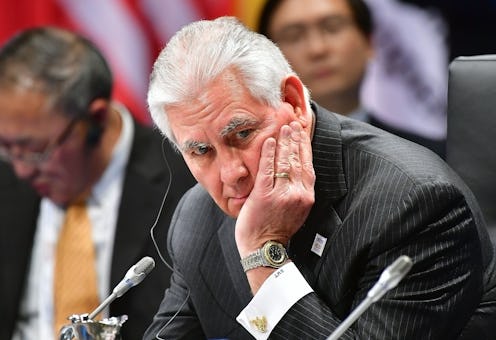News
Tillerson Skipped The Human Rights Report Release

On Friday, the U.S. State Department performed one of its traditionally celebrated annual functions, unveiling its 2016 Human Rights Report, albeit with less fanfare and official acknowledgement than usual. The reduced visibility and emphasis placed on its release has spurred some criticism, however, both in Washington, D.C. and on the part of many in the human rights community.
The bulk of the criticism stems from Secretary of State Rex Tillerson's decision not to personally appear at the unveiling. In years past, the head of the State Department has personally been on-hand for the debut of the new report, which is viewable by the public and provides American and foreign officials alike with a useful reference point for debates surrounding international policy. As it does every year, the 2016 iteration of the report provides an overview and documentation of the world's various various governments and whether they have a history of human rights abuses. Some of it is disturbing and sobering, but it's well worth your time if you're interested in world affairs.
As a vivid example, this year's report features the following description of human rights abuses in the Philippines under President Rodrigo Duterte, which also drew attention in Human Rights Watch's report earlier this week.
Since July police and unknown vigilantes have killed more than 6,000 suspected drug dealers and users as the government pursued a policy aimed of eliminating illegal drug activity in the country by the end of the year. Extrajudicial killings have been the chief human rights concern in the country for many years and they increased sharply over the past year. ... The most significant human rights problems were killings allegedly undertaken by vigilantes, security forces, and insurgents; cases of apparent governmental disregard for human rights and due process; and a weak and overburdened criminal justice system notable for slow court procedures, weak prosecutions, and poor cooperation between police and investigators.
Beyond the harrowing figure of 6,000 extrajudicial killings, the State Department report goes on to cite other human rights abuses within the Philippines, including torture of prisoners, warantless arrests, killings of journalists, and political corruption.
Taken in full, the report contains myriad descriptions of dire human rights abuses just like this, providing a valuable resource for members of the public and government officials alike. You can view all of it here.
Tillerson did write a preamble to the report, saying that "standing up for human rights and democracy is not just a moral imperative but is in the best interests of the United States in making the world more stable and secure." But unlike his Obama-era predecessors, he did not show up for its release, a move which rankled some human rights advocates. As the Washington Post's Carol Morello detailed, Human Rights Watch's Washington director Sarah Margon argued that the slight would make it easier for foreign governments to dismiss the report.
While the U.S. commitment to human rights has been imperfect, it has always been one of the key pillars of foreign policy. ... That seems to be under dramatic threat right now. The fact he’s not personally involved makes it much easier for other governments to ignore its findings.
Tillerson's decision was also met with displeasure by Florida senator Marco Rubio. He notably clashed with Rubio during his confirmation hearings, due to his refusal to strongly condemn human rights abuses by figures like Duterte and Russian president Vladimir Putin. Rubio, who ultimately voted in support of Tillerson's confirmation, tweeted his disapproval of the Secretary of State's decision prior to the report's release, saying he hoped Tillerson would "reconsider."